Презентация по английскому языку "Food Calendar of British Festivals"; 5-6 класс
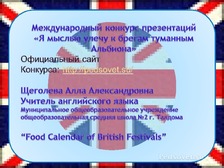
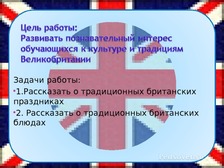
Слайд 2
Задачи работы:
1.Рассказать о традиционных британских
праздниках
2. Рассказать о традиционных британских
блюдах
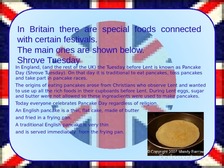
Слайд 3
In Britain there are special foods connected
with certain festivals.
The main ones are shown below.
Shrove Tuesday
In England, (and the rest of the UK) the Tuesday before Lent is known as Pancake
Day (Shrove Tuesday). On that day it is traditional to eat pancakes, toss pancakes
and take part in pancake races.
The origins of eating pancakes arose from Christians who observe Lent and wanted
to use up all the rich foods in their cupboards before Lent. During Lent eggs, sugar
and butter were not allowed so these ingreadients were used to make pancakes.
Today everyone celebrates Pancake Day regardless of religion.
An English pancake is a thin, flat cake, made of butter
and fried in a frying pan.
A traditional English pancake is very thin
and is served immediately from the frying pan.
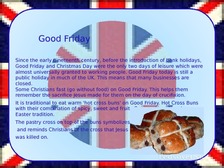
Слайд 4
Good Friday
Since the early nineteenth century, before the introduction of bank holidays,
Good Friday and Christmas Day were the only two days of leisure which were
almost universally granted to working people. Good Friday today is still a
public holiday in much of the UK. This means that many businesses are
closed.
Some Christians fast (go without food) on Good Friday. This helps them
remember the sacrifice Jesus made for them on the day of crucifixion.
It is traditional to eat warm 'hot cross buns' on Good Friday. Hot Cross Buns
with their combination of spicy, sweet and fruity flavours have long been an
Easter tradition.
The pastry cross on top of the buns symbolizes
and reminds Christians of the cross that Jesus
was killed on.
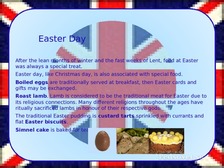
Слайд 5
Easter Day
After the lean months of winter and the fast weeks of Lent, food at Easter
was always a special treat.
Easter day, like Christmas day, is also associated with special food.
Boiled eggs are traditionally served at breakfast, then Easter cards and
gifts may be exchanged.
Roast lamb. Lamb is considered to be the traditional meat for Easter due to
its religious connections. Many different religions throughout the ages have
ritually sacrificed lambs in honour of their respective gods.
The traditional Easter pudding is custard tarts sprinkled with currants and
flat Easter biscuits.
Simnel cake is baked for tea.
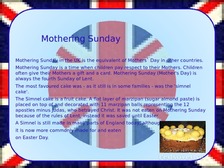
Слайд 6
Mothering Sunday
Mothering Sunday in the UK is the equivalent of Mothers` Day in other countries.
Mothering Sunday is a time when children pay respect to their Mothers. Children
often give their Mothers a gift and a card. Mothering Sunday (Mother's Day) is
always the fourth Sunday of Lent.
The most favoured cake was - as it still is in some families - was the 'simnel
cake'.
The Simnel cake is a fruit cake. A flat layer of marzipan (sugar almond paste) is
placed on top of and decorated with 11 marzipan balls representing the 12
apostles minus Judas, who betrayed Christ. It was not eaten on Mothering Sunday
because of the rules of Lent, instead it was saved until Easter.
A Simnel is still made in many parts of England today, although
it is now more commonly made for and eaten
on Easter Day.
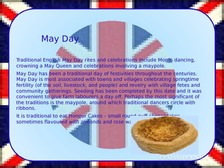
Слайд 7
May Day
Traditional English May Day rites and celebrations include Morris dancing,
crowning a May Queen and celebrations involving a maypole.
May Day has been a traditional day of festivities throughout the centuries.
May Day is most associated with towns and villages celebrating springtime
fertility (of the soil, livestock, and people) and revelry with village fetes and
community gatherings. Seeding has been completed by this date and it was
convenient to give farm labourers a day off. Perhaps the most significant of
the traditions is the maypole, around which traditional dancers circle with
ribbons.
It is traditional to eat Honour Cakes – small round puff cheesecakes
sometimes flavoured with almonds and rose water.
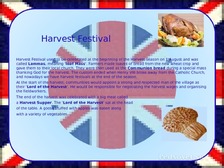
Слайд 8
Harvest Festival
Harvest Festival used to be celebrated at the beginning of the Harvest season on 1 August and was
called Lammas, meaning 'loaf Mass'. Farmers made loaves of bread from the new wheat crop and
gave them to their local church. They were then used as the Communion bread during a special mass
thanking God for the harvest. The custom ended when Henry VIII broke away from the Catholic Church,
and nowadays we have harvest festivals at the end of the season.
At the start of the harvest, communities would appoint a strong and respected man of the village as
their 'Lord of the Harvest'. He would be responsible for negotiating the harvest wages and organising
the fieldworkers.
The end of the harvest was celebrated with a big meal called
a Harvest Supper. The 'Lord of the Harvest' sat at the head
of the table. A goose stuffed with apples was eaten along
with a variety of vegetables.
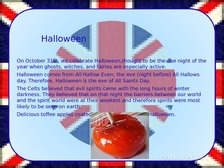
Слайд 9
Halloween
On October 31st, we celebrate Halloween,thought to be the one night of the
year when ghosts, witches, and fairies are especially active.
Halloween comes from All Hallow Even, the eve (night before) All Hallows
day. Therefore, Halloween is the eve of All Saints Day.
The Celts believed that evil spirits came with the long hours of winter
darkness. They believed that on that night the barriers between our world
and the spirit world were at their weakest and therefore spirits were most
likely to be seen on earth.
Delicious toffee apples coated in toffee are great for Halloween.
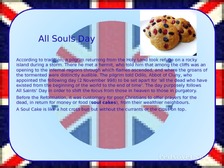
Слайд 10
All Souls Day
According to tradition, a pilgrim returning from the Holy Land took refuge on a rocky
island during a storm. There he met a hermit, who told him that among the cliffs was an
opening to the infernal regions through which flames ascended, and where the groans of
the tormented were distinctly audible. The pilgrim told Odilo, Abbot of Cluny, who
appointed the following day (2 November 998) to be set apart for 'all the dead who have
existed from the beginning of the world to the end of time'. The day purposely follows
All Saints' Day in order to shift the focus from those in heaven to those in purgatory.
Before the Reformation, it was customary for poor Christians to offer prayers for the
dead, in return for money or food (soul cakes), from their wealthier neighbours.
A Soul Cake is like a hot cross bun but without the currants or the cross on top.
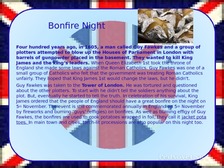
Слайд 11
Bonfire Night
Four hundred years ago, in 1605, a man called Guy Fawkes and a group of
plotters attempted to blow up the Houses of Parliament in London with
barrels of gunpowder placed in the basement. They wanted to kill King
James and the king’s leaders. When Queen Elizabeth 1st took the throne of
England she made some laws against the Roman Catholics. Guy Fawkes was one of a
small group of Catholics who felt that the government was treating Roman Catholics
unfairly. They hoped that King James 1st would change the laws, but he didn't.
Guy Fawkes was taken to the Tower of London. He was tortured and questioned
about the other plotters. To start with he didn't tell the soldiers anything about the
plot. But, eventually he started to tell the truth. In celebration of his survival, King
James ordered that the people of England should have a great bonfire on the night on
5th November. The event is still commemorated annually in England on 5 th November
by fireworks and burning ‘guys’ (effigies) on bonfires. As well as burning effigy of Guy
Fawkes, the bonfires are used to cook potatoes wrapped in foil, they call it jacket pota
toes. In main town and cities, torch-lit processions are also popular on this night too.
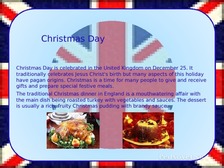
Слайд 12
Christmas Day
Christmas Day is celebrated in the United Kingdom on December 25. It
traditionally celebrates Jesus Christ's birth but many aspects of this holiday
have pagan origins. Christmas is a time for many people to give and receive
gifts and prepare special festive meals.
The traditional Christmas dinner in England is a mouthwatering affair with
the main dish being roasted turkey with vegetables and sauces. The dessert
is usually a rich, fruity Christmas pudding with brandy sauce.

Слайд 13
IMAGES RESOURSES
1.Шаблон: www.pedsovet.su (Бойкова Надежда Ивановна, МОУ СОШ
№8 г.Архангельск, учитель английского языка)
2.www.enacademic.com
3.www.allrecipes.co.uk
4.www.fotosearch.com
5.www.yandex.ru.images
6.www.mysteryloverskitchen.co
7.www.projectbritain.com

Слайд 14
TEXT RESOURSES
1.www.projectbritain.com
2.www.visitbritain.com
3.www.learnenglish.de
4.www.bbc.co.uk
5.www.harvest-festivals.net
6.www.timeanddate.com
7.www.theholidayspot.com
8.О.А. Письменная «Окна в англоязычный мир», М: Логос, 2005, 544 с.
На странице приведен фрагмент.
|
Автор: Щеголева Алла Александровна
→ Екатерина_Пашкова |
Спасибо за Вашу оценку. Если хотите, чтобы Ваше имя
стало известно автору, войдите на сайт как пользователь
и нажмите Спасибо еще раз. Ваше имя появится на этой стрнице.

Есть мнение?
Оставьте комментарий
А вы знали?
Инструкции по ПК